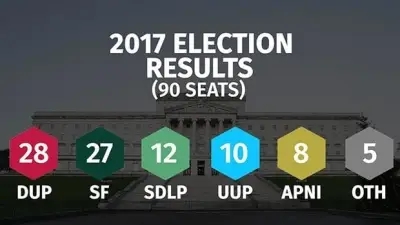In January 2017, the power sharing agreement between Unionists and Irish-Republican parties in Northern Ireland collapsed. A snap election was held and the political parties entered into negotiations about forming a new Government. With the deadline for negotiations looming, this blog takes a look at the political crisis in Northern Ireland.
Background
Northern Ireland has a unique form of governance based upon a power-sharing agreement which requires Republicans and Unionists to work together. The system was set up during the Northern Ireland peace process and is designed to provide a political settlement after decades of conflict.
To form a government, the largest nationalist and unionist parties must come together and negotiate their roles in the Assembly. The leader of the party with the most MLAs (Members of the Legislative Assembly) will become First Minister, while the leader of the second largest party will become Deputy First Minister. It is important to note that despite having different titles, the First Minister and Deputy First Minister essentially have equal authority because they are not allowed to work in isolation from each other. The largest Unionist party is the Democratic Unionist Party (DUP) and the largest Republican party is Sinn Féin.
The Assembly dissolved in January 2017, after Sinn Fein’s Martin McGuinness (who recently died due to a heart condition) resigned as Deputy First Minister. Sinn Féin refused to nominate a new Deputy Leader, leading to a collapse in the power sharing system and a snap election being called.
Why did Martin McGuinness stand down?
An ailing Martin McGuinness resigned as deputy first minister due to conflict between Sinn Féin and the DUP over a botched green energy scheme known colloquially as ‘cash for ashes’ and officially as the Renewable Heat Incentive (RHI).
The leader of the DUP, Arlene Foster, had overseen the RHI when it was first established in 2012. The scheme was designed to help businesses use more clean energy. It was recently discovered that there were serious failings in how the scheme was run – resulting in ‘over generous payments’ and serious allegations of fraud. This included some businesses installing biomass boilers to heat rooms that did not require heating, including in empty buildings, simply so they could receive the subsidies. The mishandling of the scheme is projected to cost the Northern Irish taxpayer £140 million.
Mr McGuinness stepped aside after his calls, alongside other opposition parties, for First Minister Arlene Foster to stand down from her post during the investigation into the scheme, were rejected.
The Election
As a result of Martin McGuinness’s resignation, a snap election was held on March 2nd 2017. The results of the election saw Sinn Féin make significant gains, and the DUP take some losses. The end result was that while the DUP remained the largest party at Stormont, with 28 seats, they lost their overall majority – with Sinn Fein holding 27 seats and the SDLP taking 12.
This is significant as the DUP have now lost the ability to file A Motion of Concern at Stormont. A Motion of Concern is a key power afforded to the party which holds an overall majority, and effectively allows them to veto bills which come into the Assembly. It had been previously used to block laws which would allow same-sex marriage in Northern Ireland.
After the election, Sinn Féin and the DUP were given three weeks to form a new government.
The Negotiations
It has now been almost three weeks since the snap election was held. The deadline for negotiations ends on 24th March, and very little progress has been made.
Sinn Féin are refusing to form a new government with the DUP unless Arlene Foster steps aside, at least until an inquiry into the RHI scandal is completed. Arlene Foster has said that she has no plans to do so.
Sinn Féin are also demanding that Northern Ireland receives a special deal in the Brexit negotiations. It is worth noting here that no party other than the DUP backed leaving the EU, and Northern Ireland as a whole voted against Brexit. Also significant is that the terms of Brexit may lead to a hard border between Northern Ireland and the Republic of Ireland – something which Republicans are vehemently opposed to, and could derail the fragile peace which has existed in Northern Ireland since the Good Friday Agreement.
Both the DUP and Sinn Féin have also failed to agree on funding for inquests into deaths during The Troubles and how the agencies involved should work.
The Northern Ireland Secretary, James Brokenshire, has been joined in the negotiations by the Republic of Ireland’s Foreign Minister Charlie Flanagan to attempt to help each party find common ground. Little progress seems to have been made, with President of Sinn Féin Gerry Adams, complaining that his meetings with Brokenshire were “waffle, waffle and more waffle”.
If no power-sharing government can be formed, then another way to govern Northern Ireland must be implemented. This might mean that direct rule from Westminster is re-established, however, Republicans are asking for rule to be formed by a “joint authority”, between the British and Republic of Ireland governments. Another option is for a new election to be called.
With Brexit negotiations the top priority of the UK Government, direct rule is not an attractive option. As such, the negotiation period may be extended if the DUP and Sinn Féin fail to come to an agreement by Monday.





